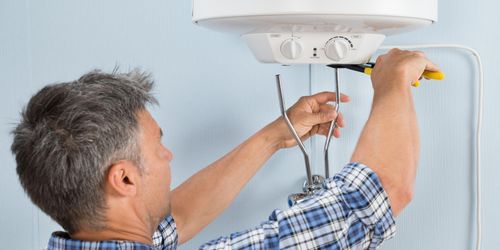Tackling the Most Frequent Hot Water Heater Emergencies
Tackling the Most Frequent Hot Water Heater Emergencies
Blog Article
Here down the page you will discover some worthwhile guidance related to Warning Signs You Need Water Heater Repairs.

A hot water heater is among one of the most important fundamental home appliances that can be located in a home. With water heaters, you don't require to experience the stress of heating water manually whenever there is a demand to wash, wash, or the recipes. There is constantly an opportunity that your water heating unit would certainly act up as with a lot of mechanical tools.
It is important to note any kind of little breakdown as well as tackle it quickly prior to things leave hand. A lot of times, your water heater begins to malfunction when there is a build-up of debris as a result of continuous usage. As a safety measure, routine flushing of your water heater is advised to prevent sediment build-up and stop useful failing.
Common hot water heater emergencies and just how to manage them
Dripping water heater container.
In this situation, you must transform off your water heating unit, allow it to cool down, and also very carefully look for the resource of the problem. At times, all you require to do is to tighten a few screws or pipeline connections in situations of small leaks. If this doesn't work and the leak persists, you might need to use the solutions of a specialist for a proper substitute.
Varying water temperature.
Your water heating unit could start creating water of various temperature levels normally ice scalding or cool hot. There might be a requirement to replace either the thermostat or the home heating unit of your water heating unit.
Too little hot water
Managing an inadequate supply of warm water can be irritating. It might be that the water heater can't sustain the hot water demand for your apartment or condo. To manage this problem, you might try to adjust your heating unit's temperature dial as well as wait on a couple of minutes. If the trouble continues, you can ask for the help of an expert plumber. Alternatively, you could upgrade your hot water heater to one with a larger capability.
Stained or odiferous water
When this takes place, you need to recognize if the problem is from the tank or the water source. If there is no amusing smell when you run chilly water, after that you are certain that it is your water heater that is faulty. The odiferous water can be created by corrosion or the buildup of microorganisms or sediments in the water heater tank.
Conclusion
Some home owners disregard little warning as well as minor faults in their water heater system. This only leads to additional damages and a feasible total failure of your device. You must deal with your hot water heater faults as quickly as they come near stay clear of even more expenditures and unnecessary emergency difficulties.
With water heating units, you don't need to go via the stress of home heating water manually every time there is a requirement to take a bath, do the washing, or the recipes. Your water heating system can begin generating water of different temperature levels typically ice chilly or scalding hot. It may be that the water heating system can not support the hot water demand for your house. If there is no funny scent when you run cool water, after that you are certain that it is your water heater that is defective. The stinky water can be created by rust or the build-up of germs or debris in the water heating unit tank.
Common Water Heater Issues and What You Should Do
What Type of Water Heater Do You Have?
Before we begin it’s first important that you identify the type of water heater you have on your property. There are two main types of water heaters out there: conventional and high efficiency.
Both of these types of products typically use either gas or electricity to heat power. There are also solar water heaters that use a thermal collector on the roof or yard to heat the water.
While these models are not as common, they can cut heating costs in half. In this article, we will focus on conventional and high efficiency.
How Do My Electric and Gas Water Heater Work?
Though they look similar, electric and gas water heaters work very differently. It’s important to know their basic function because often problems can be specific to the heating source.
In the electric model, a thermostat on the side of the machine detects the temperature of the water in the tank. When the temperature needs to rise electricity flows to a heating element suspended in the water.
Gas models also use a thermostat device — typically with a mercury sensor at the tip and an additional sensor called a thermocouple. The thermocouple detects whether the pilot light is on and controls the flow of gas.
When the thermostat drops below the appropriate level gas is released which becomes ignited by the pilot light. The flame heats the bottom of the water tank which causes hot water to rise and cold water to drop.
This natural circulation continues until the water reaches the desired temperature. Then, the thermostat triggers the gas control valve to shut off the flow of gas.
What Are the Most Common Issues and How Do You Fix Them?
https://happyhiller.com/blog/common-water-heater-issues-and-what-you-should-do/

We had been introduced to that write-up on Is Your Water Heater Leaking? through an acquaintance on another website. Sharing is caring. Helping people is fun. Bless you for your time. Don't hesitate to stop by our blog back soon.
Explore Report this page